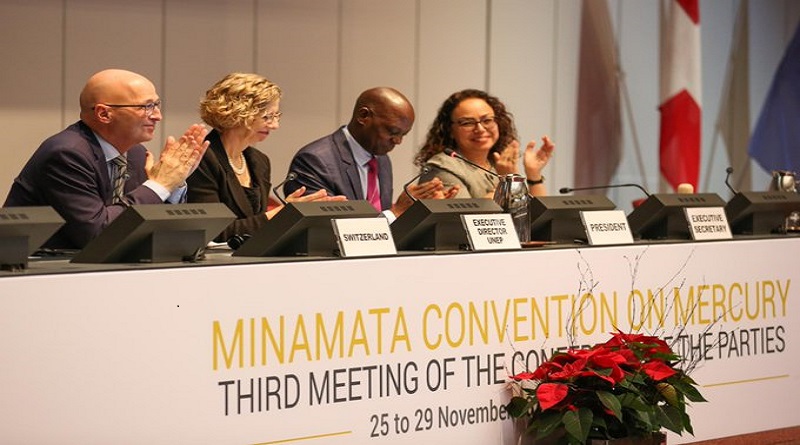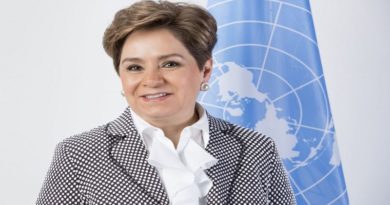Mercury Free Dentistry in Africa: The Time for Action is now, says Arotiba
The Minamata Convention is a global treaty designed to protect human health and the environment from anthropogenic emissions and releases of mercury and mercury compounds. As of November 2019, there are 128 signatories to the Convention and 115 ratifications including Nigeria and over 30 other African countries.
The global move to have a legally binding instrument to limit mercury pollution of our environment, the Minamata convention was initiated several years back. This document has been signed by several African Countries. Environmentalists involved in Arctic studies were the first to raise an alarm about the increasing concentration of mercury in the air, land and sea. The devastating consequences of mercury pollution in Minamata, a Japanese industrial city brought to the forefront the need to have a legally binding agreement.
Initial efforts were concentrated on industrial processes that employs mercury -the cement industry, oil and gas etc. It was later realized that there were other common products that contain mercury (e.g. light bulbs, sphygmanometer, dental amalgam etc. The convention immediately set a fix date to phase out (ban) the use of such materials except dental amalgam which was placed on a progressive phase down strategy. This was because it was realized that there will be need to retrain dental personnel on the use of alternatives. However, there was also stiff opposition by Dentists who believed there was no better substitute to Dental Amalgam despite its well-known human and environmental toxicity.
Progress continue to be made however, worldwide in the effort to phase down and eventually phase out dental amalgam. Many African Countries have signed the Minamata convention on mercury In June 2014 Colgate and Alliance for A Mercury Free Future (ACFF) invited all Dental School Deans in Nigeria to a one-day pre-conference meeting during the International Association for Dental Research conference in Cape Town, South Africa. Professors Amid Ismail, Nigel Pitts and Dr. Marisol Tellez were the resource persons. Their presentations highlighted current research findings on tooth decay and new prevention focused strategies for the management of tooth decay.
The Abuja declaration on mercury free dentistry for Africa was held in October 2014. On 22nd February, 2016 Sustainable Research and Action for Environmental Development in Nigeria (SRADEV) an affiliate of the World Alliance for Mercury Free Dentistry held a 1 day meeting on phase down of dental Amalgam in partnership with the Nigerian Dental Association in Ikeja, Lagos.
In June 2016, the faculty of Dental Sciences of the University of Lagos Celebrated its golden jubilee with a scientific conference titled: Phase down of Dental Amalgam-The Alternatives. This meeting was part sponsored by the World Alliance for A mercury Free Dentistry through SRADEV. There were representatives from the ministry of Education and Health. This meeting also developed the initial action plan for phase down of dental amalgam in Nigeria. This action plan was widely distributed to government and International agencies.
In May 2018, The United Nations and WAFMFD held a 2-day meeting in Bangkok Thailand. The theme of the meeting was ‘Promoting Dental Amalgam phase down measures under the Minamata convention and other initiatives, especially for women, children and future generations. This meeting was attended by participants from all continents and far reaching recommendations were made by the regional discussion panels.
In Aug 2018 the Nigerian Dental Association, Dentists Committee for Mercury Free Africa and The Association of Deans of Dental Faculties in Nigeria jointly held a 2 days meeting on the Minamata Convention and Curriculum Update in Abuja. Prof JE Frencken the inventor of Atraumatic Restorative Dentistry (ART) was the International guest speaker. There were over 200 participants. This meeting was also preceded by a 1 day meeting of all stakeholders organized by the Federal Ministry of Health to finalize the National Policy on phase down of dental amalgam.
In preparation for the third Conference of the Parties (COP 3) in Geneva, 30 African countries held a meeting in Accra Ghana to fine tune strategies for COP 3. It was at this meeting that a proposal to move amalgam to phase out by 2024 was adopted. At the Geneva meeting of COP3 however, the proposal to phase out dental amalgam was strongly opposed by other parties. Dentists’ Committee for a mercury Free Africa submitted a position paper to this meeting which explained the reasons why Africa cannot afford a prolonged phase down of dental amalgam:
a. Developing economies typical lack the technological infrastructure and systems to manage wastes generally and mercury wastes in particular;
b. Developing economies frequently lack an organized system for sorting, transport and storage or treatment of mercury wastes
c. The World Health Organization (WHO) recently reported that environmental pollution is responsible for 35%of the burden of human diseases in Sub-Saharan Africa compared to 25% worldwide.
Prolonged phase down of dental amalgam will therefore add to the environment pollution burden of Sub-Saharan Africa. Dentist’s Committee for a Mercury Free Africa therefore proposed a Leapfrogging strategy for phase down of Dental Amalgam in developing economies.
Furthermore, we recommended that Developing economies remove import duties and taxes on high viscosity glass ionomer restoratives and bioactive composites and adopt the WHO recommended Basic Package of Oral Health with ART as cornerstone principle of their national Oral Health policies.
The COP 3 Geneva meeting eventually agreed to accelerate phase down of dental Amalgam as follows:
1. Encourages Parties to take more than the two required measures in accordance with Annex A, Part II, of the Convention to phase down the use of dental amalgam;
2. Requests the Secretariat to request information from parties on the implementation of any such additional measures taken by Parties related to Annex A, part II, of the Convention;
3. Calls on the Secretariat to request information from Parties and others on information pursuant to paragraph 7 of Article 4 by 1 July 2020;
4. Requests the Secretariat to compile the information received pursuant to paragraph 3, clearly identifying the sources of the information it contains, and provide that information to Parties no later than 1 December 2020;
5. Requests the Secretariat to prepare by 30 April 2021 an information document for the fourth conference of the Parties that contains the information received from Parties pursuant to paragraph 2 and the compilation of information from paragraph 4, respectively.
In light of the above decision, dental amalgam is set to feature on the agenda at the fourth COP meeting (COP4), which will take place in Bali, Indonesia, from 31 October to 5 November in 2021.
In preparation for COP 4 in Bali, Indonesia in 2021, the secretariat of the Minamata convention invited submissions from parties.
Following this monumental decision at COP3 there have been significant movement towards phase down of dental amalgam:
1. Tanzania has phased out the use of dental amalgam in children and all women of child bearing age.
2. 47 Non-Governmental Organization Worldwide led by World Alliance for Mercury Free Dentistry have forwarded a petition to the European Union to ban the export of dental amalgam to poor developing countries.
3. The World Alliance for Mercury Free Dentistry and its affiliates have forwarded to the United Nations Secretariat of the Minamata Convention the requisite papers as requested by COP3 in preparation for COP4 meeting in Bali Indonesia in 2021.
4. Dentists committee experts have published two landmark papers in peer reviewed journals to assist countries and faculties of Dentistry to accelerate phase down:
a. Accelerating the phase down of Dental Amalgam in Africa and Developing Economies: A “leapfrogging” Strategy.
b. Implementing Mercury Free Dentistry in dental education in Africa and Developing Economies.
It is our hope that these landmark publications will assist developing economies in moving speedily towards the implementation of the objectives of the Minamata convention on Mercury with reference to Dental Amalgam.
The plan for hands on training of Dental educators and general dental practitioners in mercury free dentistry in 2020 had to be postponed in response to the global COVID-19 pandemic. However, we have plans to kickstart online webinars in collaboration with FDI, NDA and GC Corporation European Headquarters. The webinar with hands on demonstration is scheduled for November 28th 2020.
Similar webinars and online hands on demonstrations are planned from 2021 – 2022 for other African countries on a regional basis. Hopefully, Africa will be mercury free by 2024.
Prof JE Frencken (the inventor of ART) with participants, Dental School Lecturers and Nigerian Dental Association Officers and members at the Mercury Free Dentistry Seminar and curriculum update workshop in Abuja on July 24th 2019.
Prof. Godwin T. Arotiba
Founder & Chairman Dentist’s Committee for a Mercury Free Africa.




